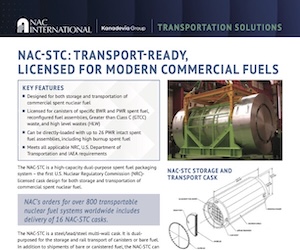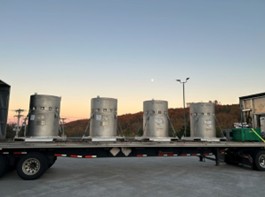MPC

Specially Designed for Older Fuel, Adaptable to Non-Fuel Waste
NAC International’s MPC – Multi-Purpose Canister System – is a transport-ready canister system specially designed for the management of spent nuclear fuel at older commercial plants.Originally developed for use at the Yankee Rowe Nuclear Power Station in Massachusetts and the Connecticut Yankee Nuclear Power Plant, both of which are now safely decommissioned, the MPC uses a high-capacity canister-based system for storage and transport of up to 26 Pressurized Water Reactor (PWR) fuel assemblies, or 68 Boiling Water Reactor (BWR) assemblies.
The MPC is designed for storing and transporting spent fuel from older U.S. nuclear plants – which will likely be the first to ship fuel to an interim storage facility.
Like the UMS™ system, the MPC canister can be placed in storage or in transport overpacks. Its fuel basket uses NAC’s patented tube-and-disk design and methodology, licensed by the U.S. Nuclear Regulatory Commission (NRC). MPC can also be used for other High-Level Waste configurations with different basket designs.
The NAC-STC cask, the first system designed for both storage and transport of standard fuels licensed by the NRC (Certificate of Compliance No. 71-9235), is used to transport MPC canisters. STC’s durability and safety have been confirmed by rigorous drop, fire, immersion and puncture testing. NAC has designed and delivered STC casks, used to transport spent fuel in China for over ten years.
NAC completed loading the MPC system at the Dairyland Power Cooperative La Crosse Boiling Water Reactor (LACBWR) in Wisconsin. MPC’s compatibility for meeting spent fuel storage and transport needs at older facilities has widespread applications for consolidated spent fuel management programs in the United States and in other countries.
The MPC design has been adapted for unique waste forms requiring dry storage at U.S. Department of Energy (DOE) sites.In addition to storage and transport of used fuel at decommissioning commecial nuclear power plants, the MPC's robust design has been modified, analyzed and approved for challenging non-fuel nuclear wastes at government sites.
For the Waste Encapsulation and Storage Facility at the DOE Hanford Site in Washington State, NAC is providing MPC canisters, storage units and associated loading equipment, modified for 1,936 highly radioactive capsules. At the DOE West Valley Demonstration Project in New York, NAC supplied 56 MPC cask systems for storage and transport of vitrified high-level waste (HLW); this was the first time that HLW had ever been placed into dry storage in the United States.
System advantages of the MPC include:
- Licensed transport overpack
- Transport ready
- Fully licensed technology
- Ready application to older sites
- High capacity
- Excellent value, smallest footprint




